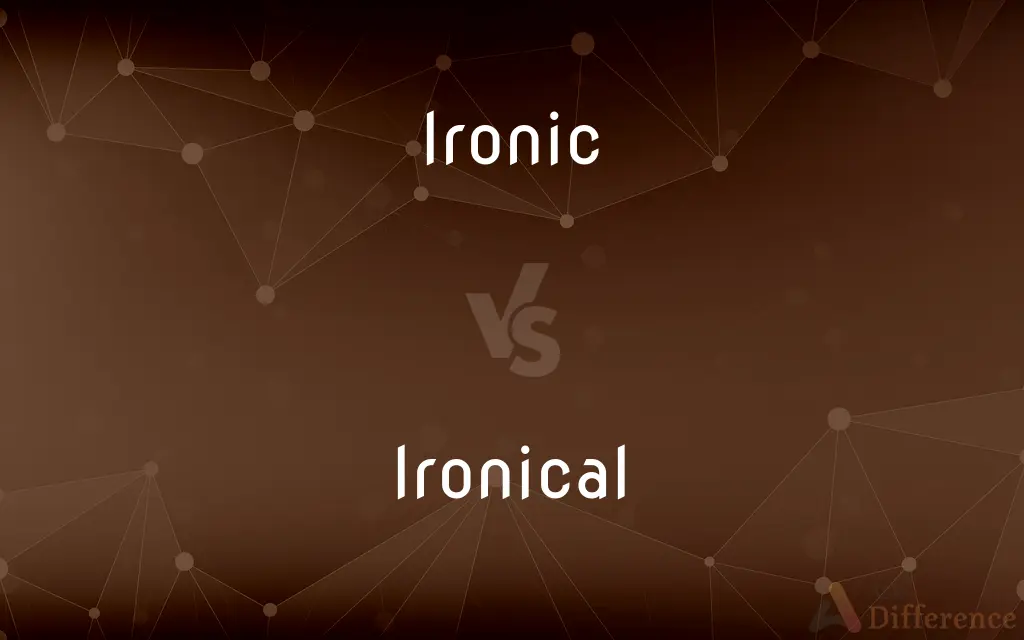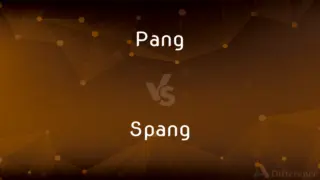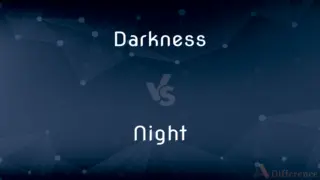Ironic vs. Ironical — What's the Difference?
Edited by Tayyaba Rehman — By Fiza Rafique — Updated on March 21, 2024
Ironic often implies an outcome that is the opposite of what was expected, while ironical can imply the same but is less common and may carry an additional layer of sarcasm or ridicule.

Difference Between Ironic and Ironical
Table of Contents
ADVERTISEMENT
Key Differences
Ironic typically refers to situations or remarks where the outcome is opposite or markedly different from what was expected, often highlighting a form of contradiction or incongruity. It's widely used in contexts ranging from literature to everyday conversation to describe scenarios where reality contradicts expectations in a surprising or thought-provoking way. Ironical, on the other hand, is a less commonly used variant that essentially carries the same meaning as ironic.
Some users of the language may employ "ironical" to suggest a more explicit or deliberate use of irony, possibly with a tone that leans more towards sarcasm or ridicule. While the distinction is subtle, and the terms are frequently used interchangeably, "ironic" is the preferred choice in most contexts.
Both ironic and ironical serve to highlight contradictions between expectations and reality, but their usage context can slightly alter their perceived emphasis. "Ironic" is more prevalent in modern usage and is typically preferred for its brevity and familiarity. It's the go-to term when referring to situations that are paradoxically contrary to what was expected or intended.
Ironical, while valid and understood, tends to be reserved for contexts where the speaker wishes to imbue a statement or situation with a sense of deliberate irony or to emphasize the mechanism of irony at play. It might be chosen for stylistic reasons or to evoke a specific nuance, particularly in literary or formal discussions about the nature of irony itself.
The choice between ironic and ironical often comes down to personal preference, context, and the subtle shades of meaning a speaker or writer wishes to convey. While "ironic" remains the dominant form, particularly in casual and contemporary discourse, "ironical" finds its place in more deliberate or nuanced explorations of irony, often when the speaker wishes to highlight the artifice or rhetorical nature of the ironic statement or situation.
ADVERTISEMENT
Comparison Chart
Definition
Pertaining to irony in the broad sense, often indicating a situation where the outcome is contrary to what was expected.
Similar to "ironic," but sometimes used to emphasize a more explicit or deliberate irony.
Usage Frequency
More commonly used.
Less commonly used.
Connotation
Generally neutral, focusing on the outcome's unexpectedness.
May carry a slightly more deliberate or sarcastic tone.
Preferred Contexts
Broad use in everyday language, literature, and academic discussions.
More often seen in literary or analytical discussions about the nature of irony.
Example
"It was ironic that the fire station burned down."
"His comment was ironical, mocking the very idea he seemed to endorse."
Compare with Definitions
Ironic
Pertaining to a situation that ends up in a way opposite to what was expected.
It was ironic how the renowned chef burned his dinner.
Ironical
Exhibiting or characterized by irony, especially in a deliberate or emphasized manner.
His ironical remarks were aimed at the absurdity of the situation.
Ironic
Expressing irony, often in a subtle or understated manner.
His ironic smile said he knew the truth all along.
Ironical
Often used in a more literary or formal context to describe an ironic statement or situation.
The author's ironical tone criticized societal norms.
Ironic
Utilized in literature to describe situations where the audience knows more than the characters.
The audience watched the ironic drama unfold, aware of the protagonist's fate.
Ironical
Implies a more pronounced discrepancy between appearance and reality.
The play's ironical ending surprised the audience with its twist.
Ironic
Reflecting an outcome that defies logical expectations.
The ironic twist at the story's end left everyone shocked.
Ironical
Can be employed to describe a more nuanced or complex form of irony.
The novel's ironical narrative challenges readers' perceptions.
Ironic
Marked by an awareness of the disparity between what is said and what is meant.
Her ironic comments made us question the sincerity of the apology.
Ironical
Sometimes suggests sarcasm or mockery in addition to the basic definition of irony.
Her ironical laughter was not missed by those familiar with her disdain.
Ironic
Characterized by or constituting irony.
Ironical
Characterized by or constituting irony.
Ironic
Given to the use of irony.
Ironical
Given to the use of irony.
Ironic
Poignantly contrary to what was expected or intended
Madness, an ironic fate for such a clear thinker.
Ironical
Poignantly contrary to what was expected or intended
Madness, an ironic fate for such a clear thinker.
Ironic
Usage Problem Coincidental or improbable.
Ironical
Usage Problem Coincidental or improbable.
Ironic
(Of a situation) Characterized by or constituting (any kind of) irony.
It's somewhat ironic to have a wave of smog right on Earth Day.
Ironical
Characterized by or constituting (any kind of) irony.
Ironic
(proscribed) Odd or coincidental; strange.
It's ironic that we are eating a sandwich in Sandwich, Massachusetts.
Ironical
Given to the use of irony; sarcastic.
Ironic
(preceded with "being") Acting in a unserious and teasing manner.
Don't take it personally. We're just being ironic.
Ironical
(obsolete) Feigning ignorance; simulating lack of instruction or knowledge; exhibiting Socratic irony.
Ironic
(Of a statement, action, etc.) Done in an insincere and mocking manner; satirical.
You should assume that everything this guy posts is ironic.
Ironical
Pertaining to irony; containing, expressing, or characterized by, irony; as, an ironical remark.
Ironic
Ironical.
Ironical
Addicted to the use of irony; given to irony.
Ironic
Humorously sarcastic or mocking;
Dry humor
An ironic remark often conveys an intended meaning obliquely
An ironic novel
An ironical smile
With a wry Scottish wit
Ironical
Characterized by often poignant difference or incongruity between what is expected and what actually is;
Madness, an ironic fate for such a clear thinker
It was ironical that the well-planned scheme failed so completely
Ironic
Characterized by often poignant difference or incongruity between what is expected and what actually is;
Madness, an ironic fate for such a clear thinker
It was ironical that the well-planned scheme failed so completely
Ironical
Humorously sarcastic or mocking;
Dry humor
An ironic remark often conveys an intended meaning obliquely
An ironic novel
An ironical smile
With a wry Scottish wit
Common Curiosities
Which term is more prevalent in modern English?
"Ironic" is more prevalent in both spoken and written modern English.
What is the primary difference between ironic and ironical?
The primary difference lies in usage and frequency; "ironic" is more commonly used and broadly understood, while "ironical" might be chosen to emphasize a more nuanced or deliberate irony.
Can ironic and ironical be used interchangeably?
Yes, in most contexts, they can be used interchangeably, though "ironic" is generally preferred for its brevity and familiarity.
Is there a difference in formality between the two terms?
"Ironical" can be considered slightly more formal or literary than "ironic."
Do ironic and ironical have the same origin?
Yes, both terms originate from the concept of irony in ancient Greek, where it originally referred to feigned ignorance or Socratic irony.
Can something be unintentionally ironic or ironical?
Yes, situations can be unintentionally ironic or ironical when outcomes are opposite of what is expected, without deliberate intent.
Is the use of irony always obvious?
No, irony, whether described as ironic or ironical, can be subtle and may require context or additional knowledge to be fully appreciated.
Are there different types of irony?
Yes, there are several types, including situational irony, dramatic irony, and verbal irony.
How do ironic and ironical relate to sarcasm?
Both can relate to sarcasm, especially when irony is used to mock or convey contempt, though irony can exist without sarcasm.
How does irony enhance storytelling or humor?
Irony can add depth, complexity, and humor to storytelling by contrasting expectations with reality, often leading to surprise or reflection.
How do cultures differ in their use of irony?
Cultural perceptions of irony can vary widely, with some cultures embracing it as a form of wit and others finding it confusing or less appealing.
How do you identify something as ironic or ironical?
Identifying something as ironic or ironical involves recognizing a discrepancy between expectations and actual outcomes or between literal and intended meanings.
Can irony be found in visual arts or music?
Yes, irony can be expressed in visual arts and music through juxtaposition, unexpected contrasts, and thematic contradictions.
Share Your Discovery

Previous Comparison
Pang vs. Spang
Next Comparison
Darkness vs. NightAuthor Spotlight
Written by
Fiza RafiqueFiza Rafique is a skilled content writer at AskDifference.com, where she meticulously refines and enhances written pieces. Drawing from her vast editorial expertise, Fiza ensures clarity, accuracy, and precision in every article. Passionate about language, she continually seeks to elevate the quality of content for readers worldwide.
Edited by
Tayyaba RehmanTayyaba Rehman is a distinguished writer, currently serving as a primary contributor to askdifference.com. As a researcher in semantics and etymology, Tayyaba's passion for the complexity of languages and their distinctions has found a perfect home on the platform. Tayyaba delves into the intricacies of language, distinguishing between commonly confused words and phrases, thereby providing clarity for readers worldwide.














































